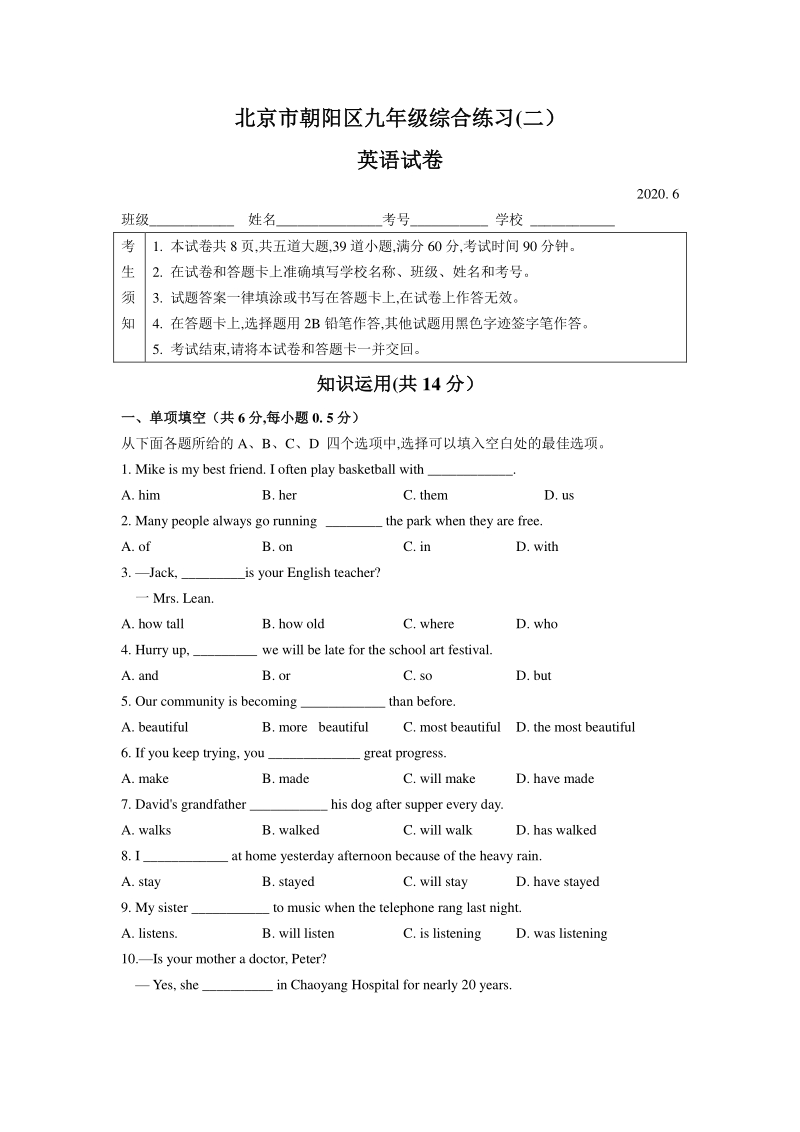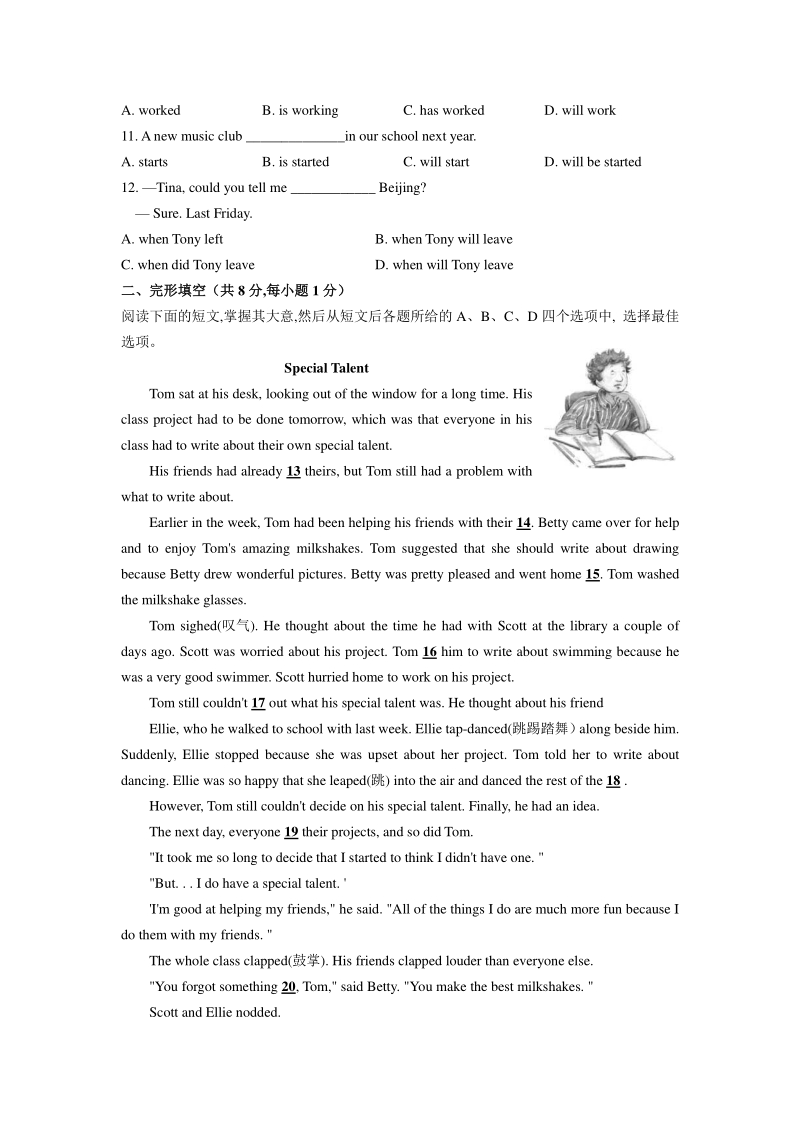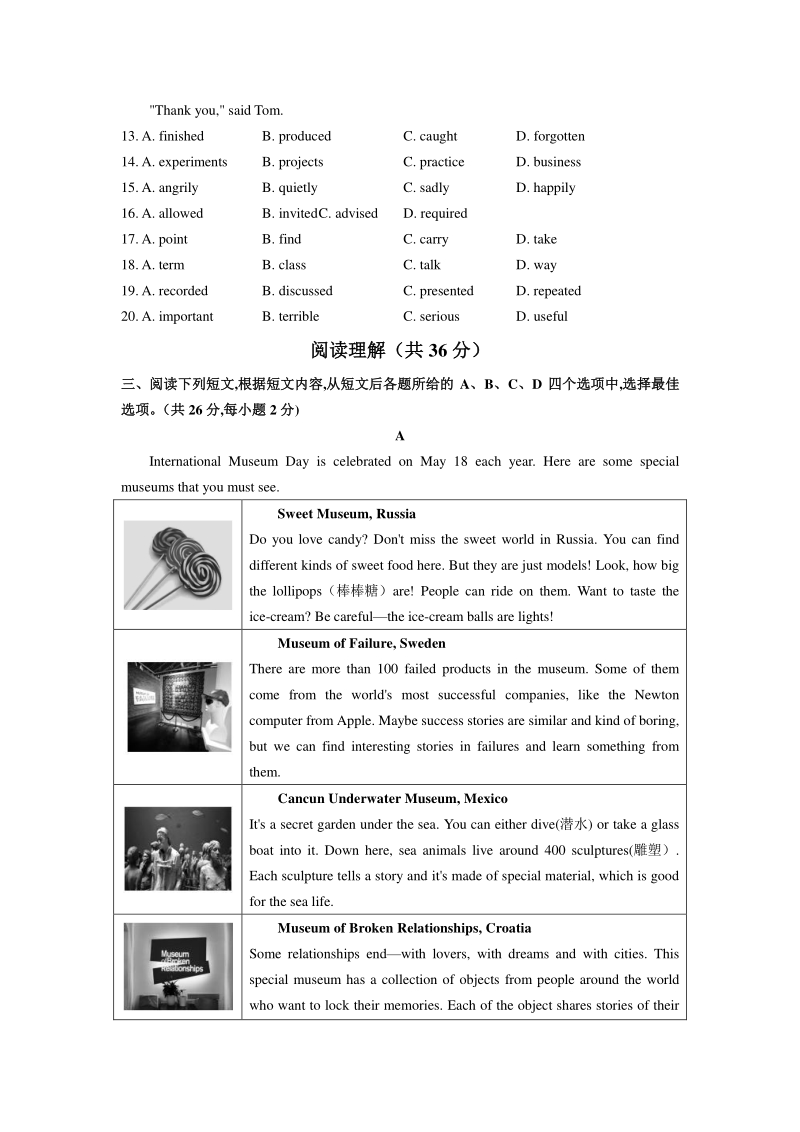 2020年6月北京市朝阳区中考二模英语试题(含答案)
2020年6月北京市朝阳区中考二模英语试题(含答案)
《2020年6月北京市朝阳区中考二模英语试题(含答案)》由会员分享,可在线阅读,更多相关《2020年6月北京市朝阳区中考二模英语试题(含答案)(10页珍藏版)》请在七七文库上搜索。
1、北京市朝阳区九年级综合练习北京市朝阳区九年级综合练习(二)二) 英语试卷英语试卷 2020. 6 班级_ 姓名_考号_ 学校 _ 考 生 须 知 1. 本试卷共 8 页,共五道大题,39 道小题,满分 60 分,考试时间 90 分钟。 2. 在试卷和答题卡上准确填写学校名称、班级、姓名和考号。 3. 试题答案一律填涂或书写在答题卡上,在试卷上作答无效。 4. 在答题卡上,选择题用 2B 铅笔作答,其他试题用黑色字迹签字笔作答。 5. 考试结束,请将本试卷和答题卡一并交回。 知识运用知识运用(共共 14 分)分) 一、单项填空(共一、单项填空(共 6 分分,每小题每小题 0. 5 分)分) 从下
2、面各题所给的 A、B、C、D 四个选项中,选择可以填入空白处的最佳选项。 1. Mike is my best friend. I often play basketball with _. A. him B. her C. them D. us 2. Many people always go running _ the park when they are free. A. of B. on C. in D. with 3. Jack, _is your English teacher? 一 Mrs. Lean. A. how tall B. how old C. where D. who
3、 4. Hurry up, _ we will be late for the school art festival. A. and B. or C. so D. but 5. Our community is becoming _ than before. A. beautiful B. more beautiful C. most beautiful D. the most beautiful 6. If you keep trying, you _ great progress. A. make B. made C. will make D. have made 7. Davids g
4、randfather _ his dog after supper every day. A. walks B. walked C. will walk D. has walked 8. I _ at home yesterday afternoon because of the heavy rain. A. stay B. stayed C. will stay D. have stayed 9. My sister _ to music when the telephone rang last night. A. listens. B. will listen C. is listenin
5、g D. was listening 10.Is your mother a doctor, Peter? Yes, she _ in Chaoyang Hospital for nearly 20 years. A. worked B. is working C. has worked D. will work 11. A new music club _in our school next year. A. starts B. is started C. will start D. will be started 12. Tina, could you tell me _ Beijing?
6、 Sure. Last Friday. A. when Tony left B. when Tony will leave C. when did Tony leave D. when will Tony leave 二、完形填空(共二、完形填空(共 8 分分,每小题每小题 1 分)分) 阅读下面的短文,掌握其大意,然后从短文后各题所给的 A、B、C、D 四个选项中, 选择最佳 选项。 Special Talent Tom sat at his desk, looking out of the window for a long time. His class project had to b
7、e done tomorrow, which was that everyone in his class had to write about their own special talent. His friends had already 13 theirs, but Tom still had a problem with what to write about. Earlier in the week, Tom had been helping his friends with their 14. Betty came over for help and to enjoy Toms
8、amazing milkshakes. Tom suggested that she should write about drawing because Betty drew wonderful pictures. Betty was pretty pleased and went home 15. Tom washed the milkshake glasses. Tom sighed(叹气). He thought about the time he had with Scott at the library a couple of days ago. Scott was worried
9、 about his project. Tom 16 him to write about swimming because he was a very good swimmer. Scott hurried home to work on his project. Tom still couldnt 17 out what his special talent was. He thought about his friend Ellie, who he walked to school with last week. Ellie tap-danced(跳踢踏舞) along beside h
10、im. Suddenly, Ellie stopped because she was upset about her project. Tom told her to write about dancing. Ellie was so happy that she leaped(跳) into the air and danced the rest of the 18 . However, Tom still couldnt decide on his special talent. Finally, he had an idea. The next day, everyone 19 the
11、ir projects, and so did Tom. “It took me so long to decide that I started to think I didnt have one. “ “But. . . I do have a special talent. Im good at helping my friends,“ he said. “All of the things I do are much more fun because I do them with my friends. “ The whole class clapped(鼓掌). His friend
12、s clapped louder than everyone else. “You forgot something 20, Tom,“ said Betty. “You make the best milkshakes. “ Scott and Ellie nodded. “Thank you,“ said Tom. 13. A. finished B. produced C. caught D. forgotten 14. A. experiments B. projects C. practice D. business 15. A. angrily B. quietly C. sadl
13、y D. happily 16. A. allowed B. invited C. advised D. required 17. A. point B. find C. carry D. take 18. A. term B. class C. talk D. way 19. A. recorded B. discussed C. presented D. repeated 20. A. important B. terrible C. serious D. useful 阅读理解(共阅读理解(共 36 分)分) 三、阅读下列短文三、阅读下列短文,根据短文内容根据短文内容,从短文后各题所给的
14、从短文后各题所给的 A、B、C、D 四个选项中四个选项中,选择最佳选择最佳 选项。 (共选项。 (共 26 分分,每小题每小题 2 分分) A International Museum Day is celebrated on May 18 each year. Here are some special museums that you must see. Sweet Museum, Russia Do you love candy? Dont miss the sweet world in Russia. You can find different kinds of sweet food
15、 here. But they are just models! Look, how big the lollipops(棒棒糖)are! People can ride on them. Want to taste the ice-cream? Be carefulthe ice-cream balls are lights! Museum of Failure, Sweden There are more than 100 failed products in the museum. Some of them come from the worlds most successful com
16、panies, like the Newton computer from Apple. Maybe success stories are similar and kind of boring, but we can find interesting stories in failures and learn something from them. Cancun Underwater Museum, Mexico Its a secret garden under the sea. You can either dive(潜水) or take a glass boat into it.
17、Down here, sea animals live around 400 sculptures(雕塑). Each sculpture tells a story and its made of special material, which is good for the sea life. Museum of Broken Relationships, Croatia Some relationships endwith lovers, with dreams and with cities. This special museum has a collection of object
18、s from people around the world who want to lock their memories. Each of the object shares stories of their past relationships. 21. You can find different kinds of sweet food in Sweet Museum in _. A.Russia B. Sweden C. Mexico D. Croatia 22. If youre interested in sculptures, you may go to _. A. Sweet
19、 Museum B. Cancun Underwater Museum C. Museum of Failure D. Museum of Broken Relationships 23. People can know _ in Museum of Failure and Museum of Broken Relationships. A. lollipops B. sea animals C. stories D. glass boats B My First Marathon(马拉松马拉松) A month before my first marathon, one of my ankl
20、es was hurt and this meant not running for two weeks, leaving me only two weeks to train. Yet, I decided to go ahead. I remember back to my 7th year in school. After my first PE class, the teacher told me that I was “not athletic(运动型的)“. The idea that I was “not athletic“ stuck with me for years. Wh
21、en I started running in my 30s, I realized running was a fight against myself, not about competition or whether or not I was athletic. It was all about the fight against my own body and mind. A test of wills! The night before my marathon, I dreamed that I couldnt even find the finish line. I woke up
22、, being helpless and nervous but ready to prove something to myself. Shortly after crossing the start line, my shoe lace became untied. So I stopped to tie it. Not the start I wanted! I had been left behind others at the beginning. At mile 3, I passed a sign: “GO FOR IT, RUNNERS!“ By mile 17, I beca
23、me out of breath and the once-hurt-ankle hurt badly, but I still stayed the course, walking a bit and then running again. As I came near to mile 23, I could see my wife waving a sign. She is my biggest fan. She never minded the alarm clock sounding at 4 a. m. or questioned my expenses on running. I
24、was one of the final runners to finish. But I finished! And I got a medal. In fact, I got the same medal as the one that the person who came in first place had. I can now call myself a “marathon winner“. 24. What happened to the writer a month before his marathon? A. He hurt his knees. B. He got hur



- 配套讲稿:
如PPT文件的首页显示word图标,表示该PPT已包含配套word讲稿。双击word图标可打开word文档。
- 特殊限制:
部分文档作品中含有的国旗、国徽等图片,仅作为作品整体效果示例展示,禁止商用。设计者仅对作品中独创性部分享有著作权。
- 关 键 词:
- 2020 北京市 朝阳区 中考 英语试题 答案
 七七文库所有资源均是用户自行上传分享,仅供网友学习交流,未经上传用户书面授权,请勿作他用。
七七文库所有资源均是用户自行上传分享,仅供网友学习交流,未经上传用户书面授权,请勿作他用。
文档标签
- 英语试题
- 2020北京市英语招生
- 北京信息卷英语
- 越秀 中考 一模 英语
- 北京专家2021届信息卷(四)英语试题及答案
- 2020北京市朝阳区
- 2020北京市朝阳区期末
- 2021届北京京星教育中心信息卷英语答案
- 英语试题五
- 2020年北京市朝阳区高考二模数学试题含答案
- 北京市密云区2020届中考英语二模试题含答案
- 2020年6月北京市朝阳区中考二模物理试卷含答案
- 2017年北京市朝阳区中考二模语文试题及答案
- 2020年北京市昌平区中考二模语文试题含答案
- 2019年北京市朝阳区中考二模物理试题及答案
- 2020北京市密云区中考一模英语试题含答案
- 2020届北京市密云区中考二模英语试题含答案
- 2020年6月北京市密云区中考二模数学试题含答案
- 2020年沈阳于洪区英语二模
- 大东2020英语二模



 浙公网安备33030202001339号
浙公网安备33030202001339号
链接地址:https://www.77wenku.com/p-145614.html